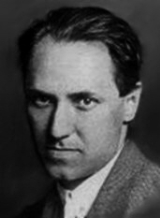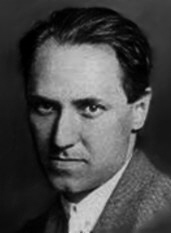
Leo Weiner
Encyclopedia

Hungary
Hungary , officially the Republic of Hungary , is a landlocked country in Central Europe. It is situated in the Carpathian Basin and is bordered by Slovakia to the north, Ukraine and Romania to the east, Serbia and Croatia to the south, Slovenia to the southwest and Austria to the west. The...
music
Music
Music is an art form whose medium is sound and silence. Its common elements are pitch , rhythm , dynamics, and the sonic qualities of timbre and texture...
educators of the first half of the twentieth century and a composer
Composer
A composer is a person who creates music, either by musical notation or oral tradition, for interpretation and performance, or through direct manipulation of sonic material through electronic media...
.
Education
Weiner was born in BudapestBudapest
Budapest is the capital of Hungary. As the largest city of Hungary, it is the country's principal political, cultural, commercial, industrial, and transportation centre. In 2011, Budapest had 1,733,685 inhabitants, down from its 1989 peak of 2,113,645 due to suburbanization. The Budapest Commuter...
. He had his first music and piano
Piano
The piano is a musical instrument played by means of a keyboard. It is one of the most popular instruments in the world. Widely used in classical and jazz music for solo performances, ensemble use, chamber music and accompaniment, the piano is also very popular as an aid to composing and rehearsal...
lessons from his brother, and later studied at the Academy of Music
Franz Liszt Academy of Music
The Franz Liszt Academy of Music is a concert hall and music conservatory in Budapest, Hungary, founded on November 14, 1875...
in Budapest, studying with János (Hans) Koessler
Hans von Koessler
Hans von Koessler was a German composer, conductor and music teacher. In Hungary, where he worked for 26 years, he was known as János Koessler....
. While there, he won numerous prizes, including: the Franz Liszt Stipend, the Volkmann Prize, and the Erkel Prize, all for one composition: his Serenade, Op.
Opus number
An Opus number , pl. opera and opuses, abbreviated, sing. Op. and pl. Opp. refers to a number generally assigned by composers to an individual composition or set of compositions on publication, to help identify their works...
3.
Teaching career
In 1908, he became a theoryMusic theory
Music theory is the study of how music works. It examines the language and notation of music. It seeks to identify patterns and structures in composers' techniques across or within genres, styles, or historical periods...
teacher at the Budapest Academy of Music. He was appointed Professor of Composition in 1912 and Professor of Chamber Music in 1920. In 1949 he became Emeritus Professor, but he continued to teach until the end of his life. He died in Budapest.
Compositions
As a composer, the Romantics from BeethovenLudwig van Beethoven
Ludwig van Beethoven was a German composer and pianist. A crucial figure in the transition between the Classical and Romantic eras in Western art music, he remains one of the most famous and influential composers of all time.Born in Bonn, then the capital of the Electorate of Cologne and part of...
through Mendelssohn
Felix Mendelssohn
Jakob Ludwig Felix Mendelssohn Barthóldy , use the form 'Mendelssohn' and not 'Mendelssohn Bartholdy'. The Grove Dictionary of Music and Musicians gives ' Felix Mendelssohn' as the entry, with 'Mendelssohn' used in the body text...
most strongly affected Weiner's musical approach. His sense of orchestral color seems to relate to those French
France
The French Republic , The French Republic , The French Republic , (commonly known as France , is a unitary semi-presidential republic in Western Europe with several overseas territories and islands located on other continents and in the Indian, Pacific, and Atlantic oceans. Metropolitan France...
composers who were not notably affected by Wagner
Richard Wagner
Wilhelm Richard Wagner was a German composer, conductor, theatre director, philosopher, music theorist, poet, essayist and writer primarily known for his operas...
, especially to that of Bizet
Georges Bizet
Georges Bizet formally Alexandre César Léopold Bizet, was a French composer, mainly of operas. In a career cut short by his early death, he achieved few successes before his final work, Carmen, became one of the most popular and frequently performed works in the entire opera repertory.During a...
. This solid and conservative Romantic approach served the basis for his style which later was influenced by elements of Hungarian folk music
Hungarian folk music
Hungarian folk music includes a broad array of styles, including the recruitment dance verbunkos, the csárdás and nóta.During the 20th century, Hungarian composers were influenced by the traditional music of their nation which may be considered as a repeat of the early "nationalist" movement of the...
. However, he did not conduct research in the area of folk music, as his contemporaries Bartók
Béla Bartók
Béla Viktor János Bartók was a Hungarian composer and pianist. He is considered one of the most important composers of the 20th century and is regarded, along with Liszt, as Hungary's greatest composer...
and Kodály
Zoltán Kodály
Zoltán Kodály was a Hungarian composer, ethnomusicologist, pedagogue, linguist, and philosopher. He is best known internationally as the creator of the Kodály Method.-Life:Born in Kecskemét, Kodály learned to play the violin as a child....
did, but simply shared an interest in the subject and employed some elements of folk music without affecting his established harmonic language.
Among Weiner's notable compositions are a string trio
String trio
A string trio is a group of three string instruments or a piece written for such a group. The term is generally used with reference to works of chamber music from the Classical period to the present.-History:...
, three string quartet
String quartet
A string quartet is a musical ensemble of four string players – usually two violin players, a violist and a cellist – or a piece written to be performed by such a group...
s, two violin sonata
Violin sonata
A violin sonata is a musical composition for violin, which is nearly always accompanied by a piano or other keyboard instrument, or by figured bass in the Baroque period.-A:*Ella Adayevskaya**Sonata Greca for Violin or Clarinet and Piano...
s, five divertimenti
Divertimento
Divertimento is a musical genre, with most of its examples from the 18th century. The mood of the divertimento is most often lighthearted and it is generally composed for a small ensemble....
for orchestra, a symphonic poem
Symphonic poem
A symphonic poem or tone poem is a piece of orchestral music in a single continuous section in which the content of a poem, a story or novel, a painting, a landscape or another source is illustrated or evoked. The term was first applied by Hungarian composer Franz Liszt to his 13 works in this vein...
, and numerous chamber
Chamber music
Chamber music is a form of classical music, written for a small group of instruments which traditionally could be accommodated in a palace chamber. Most broadly, it includes any art music that is performed by a small number of performers with one performer to a part...
and piano pieces. Most pianists will instantly recognize his lively "Fox Dance".

